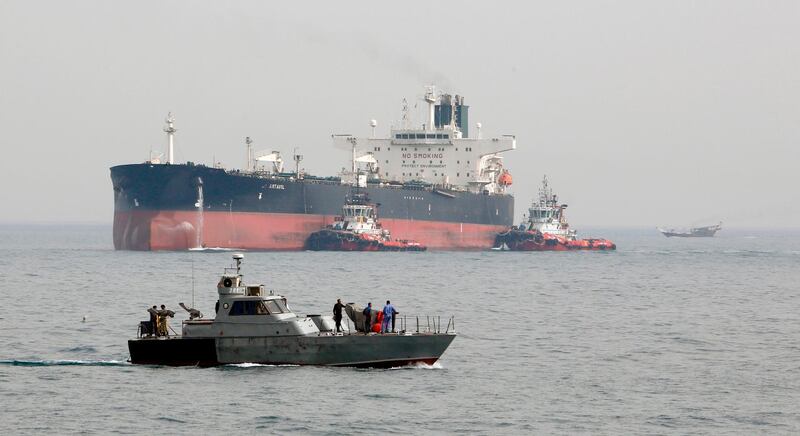Three of eight importers granted waivers by Washington to buy oil from Iran have now cut their shipments to zero, a US official said, adding that improved global oil market conditions would help reduce Iranian crude exports further.
The United States reimposed sanctions on Iran after President Donald Trump last May withdrew the country from a 2015 nuclear deal between Iran and several world powers, accusing it of supporting terrorism and conflicts in Syria and Yemen.
While the US has set a goal of completely halting Iran's oil exports, it granted temporary import waivers to China, India, Greece, Italy, Taiwan, Japan, Turkey and South Korea to ensure low oil prices and no disruption to the global oil market.
The Trump administration is currently in consultations with the importers ahead of a May 2 deadline, when the waivers expire, Reuters reported.
"In November, we granted eight oil waivers to avoid a spike in the price of oil. I can confirm today, three of those importers are now at zero," Brian Hook, the special US envoy for Iran, said on Tuesday.
Mr Hook did not identify the three countries.
"There are better market conditions for us to accelerate our path to zero," he said. "We are not looking to grant any waivers or exceptions to our sanctions regime."
Mr Hook said US oil sanctions against Iran had removed about 1.5 million barrels of Iranian oil exports from the market since May 2018.
"This has denied the regime access to well over $10 billion in [oil] revenue, a loss of at least $30 million a day," he said.
Oil prices rose for a fourth day on Wednesday, holding firm despite an industry report showing that US inventories rose unexpectedly last week, with supply cuts and sanctions supporting the market.
Brent futures rose 22 cents, or 0.3 per cent, to $69.59 a barrel by 00.28am GMT, after earlier reaching $69.68, the highest since November 13. The global benchmark closed half a per cent higher on Tuesday.
US West Texas Intermediate crude rose 6 cents, or 0.1 per cent, to $62.64 cents a barrel. On Tuesday, the contract rose 1.61 per cent, to settle at $62.58 a barrel, after touching $62.75, its highest level since November 7.
"With output falling for a fourth month thanks to continued Opec production cuts and sanctions on Iran and Venezuela, oil prices are well supported," Fiona Cincotta, senior market analyst at Cityindex, said in a note.
"On the demand side, easing economic slowdown fears are also offering support," she said.
Analysts believe the US administration is likely to extend the waivers to the remaining five importers to placate top buyers China and India and to decrease the chance of higher oil prices.
China, India, Japan, South Korea and Turkey are likely to be given waivers that could cap Iran's crude oil exports at about 1.1 million barrels per day, US analysts at Eurasia Group said in January. That would remove Italy, Greece and Taiwan from the waivers list.
Mr Hook said a decision on whether to extend the waivers would be made "in due course". A total of 23 importers that once took Iranian oil had cut imports to zero, he added.
"With oil prices actually lower than they were when we announced our sanctions and global production stable, we are on the fast track to zeroing out all purchases of Iranian crude," he said.
A senior Trump administration official told reporters on Monday that the US government was considering additional sanctions against Iran that would target areas of its economy that have not been hit before.
Mr Hook said more than 26 rounds of US sanctions against Iran had restricted the country's cash flow and constrained its ability to operate in the region.
Earlier on Tuesday, US Secretary of State Mike Pompeo blamed Iran's government of mismanagement that has led to devastating flooding across the country. At least 47 people have been killed in the past two weeks from flash floods.
Last month, Bloomberg reported that Mr Trump’s national security team was deeply divided over whether to let some countries keep buying Iranian oil after the US deadline on sanctions waivers expires in May.
The division - primarily between John Bolton’s National Security Council and Michael Pompeo’s State Department - led to rising frustration and flared tempers, exposing fault lines over how the president’s most senior advisers approach the Iran issue, according to sources.
It is the president who must weigh competing priorities. While Mr Trump wants to make good on his “maximum pressure” campaign against Iran and strong-arm it into meeting US demands - including ending its ballistic missile tests and support for Hezbollah - there’s also concern that squeezing Tehran too much will lead to a further spike in oil prices. That could raise gasoline costs for US drivers as the 2020 election nears.







